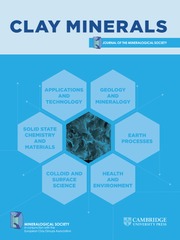Article contents
Thermally induced mineral and chemical transformations in calcareous mudstones around a basaltic dyke (Perthus Pass, southern Massif Central, France). Possible implications as a natural analogue of nuclear waste disposal
Published online by Cambridge University Press: 09 July 2018
Abstract
A mixed-layer illite-smectite, illite-rich calcareous mudstone intruded by a basaltic dyke at the Perthus Pass (southern Massif Central, France) allows us to study the transformation of clays subjected to a brief thermal gradient. X-ray diffraction, scanning electron microscopy, electron microprobe and atomic absorption spectroscopy analyses were performed on samples at variable distances from the mudstone-dyke contacts.
A roughly similar evolution is seen on both sides of the dyke: quartz, calcite, kaolinite and illite disappear; Ca-silicates, albite and saponite-beidellite form, late meteoric halloysite crystallizes in open fractures.
Chemical and mineralogical transformations are related to heat diffusion from the dyke. Theoretical calculations highlight the influence of the dyke orientation. The mineralogical reactions observed in rocks are similar to those observed in experimental conditions. The formation of new swelling phases with a high retention capacity linked to a short duration, large-temperature increase, should constitute a positive process for Repository Performance Assessment.
Keywords
- Type
- Research Article
- Information
- Copyright
- Copyright © The Mineralogical Society of Great Britain and Ireland 2007
References
- 3
- Cited by


